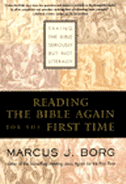In this chapter we encounter the Tribe of
Isreal, The Legends of Isreal, The History
of Israel, The Idea of Israel. For this is
an unusual history. Borg tells us it is metaphorical
and to some extent historical. Well that's
something to say all right, but it doesn't
ring out loud. What does ring out at every
turn is that everything means something!
It would be as if in Canada today we first
asked "How does our history speak
to
us today?". We do practice this
sort
of metaphorization a little in Canada.
For
example, the building of the railroad
turned
into more than history because it was
heroic
and helped define us. But at EVERY
TURN?
But the people of the Bible did, and
the
"people of the Book" still
do.
Borg then introduces us to the history/meaning
the foundational/ceremonial/legal aspects
of this history. It has been said that
Israel
is a nation that wrote up its own history.
They are so old, that they could and
to some
extent did just that. And it is of
great
interest that in doing so, they understood
the guidance of their God YHWH at every
turn.
The Pentetuch says basically that after God
created the world, he created Israel. This
starts with Abraham and Sarah and leads in
only 3 generations to the 12 fathers of the
tribes of Isreal. But the real birth of the
nation is when Moses takes them captive from
Egypt to the Promised Land of Canaan. It
is an ancient history with fragments of magic
and various eastern religions. It is a story
of male society. It is a story of intrigue.
But each twist and turn of the story was
a part of Israel's history and an element
in the ordering of their society. Borg cites
613 laws in the Pentateuch altogether. The
story was written as far away as 900 and
as close as 400 BCE. The real questions of
this "history" Borg says are 1-WHY
did Israel tell these stories? and 2-Why
did she tell this THIS WAY? |
PROMISE AND FULFILLMENT. This is the over-arching
sturcture and theme. A wonderful promised
land. Formidable obstacles and promise
fulfilled.
A "sacred melodrama".
BARRENESS OF THE MATRIARCHS. That the
key
women in this story Sarah, Rebeckah
and Rachel
are barren. So when then get pregnant,
it
is clearly God's doing. That of course
is
the lesson. You can trust God's promises.
JOSEPH AND BROTHERS. In this most familiar
story Joseph is sold by his brothers
(the
progenitors of Israel!) to Egypt and
everything
works out fine later. Joseph says to
his
brothers you see it was necessary for
this
to happen. Lesson: no matter how terrible
things are, God has a hand in everything
and if you trust him things will work
out.
This was pretty radical theology at
a time
when God's were to be placated and
feared
and whose success was measured by the
tribes
welfare. Here was the idea that God
was looking
after things just fine no matter how
terrible,
and that Israel's job was to trust.
God's
status and authority did not depend
on his
"doing a good job" as was
the general
idea with the neighbours.
THE EXODUS - ISRAELS PRIMAL NARRATIVE. In
this phrase we have it. This was and is the
centre of the Jewish idea of their becoming
a people - it is a constantly true process.
Borg points out that debating the details
of historicity is not particularly helpful,
Cecil B DeMille's movie notwithstanding.
Rather the questions of WHY?
EGYPT AND BONDAGE and MOSES. Each year
at
passover, Jewish families recite the
brief
and beautiful capsule history of Deuternomy
26 that Borg quotes at the chapter
start.
It is a catechism. And each thing fits
life
still today as through all the years
between.
LAW. Part of the story is the 613 rules of
Jewish Law. Here they are given a holy origin
although they are the development of many
centuries. In most respects they are not
a lot different than other cultures. But
in some respects they are remarkably unique.
Here are rules of justice, charity, land
and money that enables Israel to avoid the
concentration of power into the hands of
the few as always seems to happen in human
history. And later, prophets would arise
to remind them of this traditional concern
for justice and charity. The genius and unique
aspects of the Pentateuch were that some
of these rules were intended to control the
natural forces of human oppresion and economic
exploitation. Rules for widows and the poor.
Like you couldn't harvest the corners of
the fields - they were for the poor. Rules
like 7 year forgiveness of debt. Rules like
Jubilee return of land to original family.
INFIDELITY. A part of the exodus story,
a
part of each person's life.
MIRACLES. Borg makes an interesting
observation
respecting the seas parting and other
traditional
miracles on the grand scale in these
stories.
A weakness in thinking that these things
were literally true is that that would
mean
it was in the character of God to do
this
sort of thing - to intervene spectacularly
for his chosen ones. And the show-stopper
question then is why not since, and
why not
in the following years unto our own
terrible
time. This was the sort of wrestling
of course
that led many moderns on account of
Holocaust
to become atheists of one sort or another.
BOTTOM LINE - You can count on YHWH
and his
promises.
jmct |



